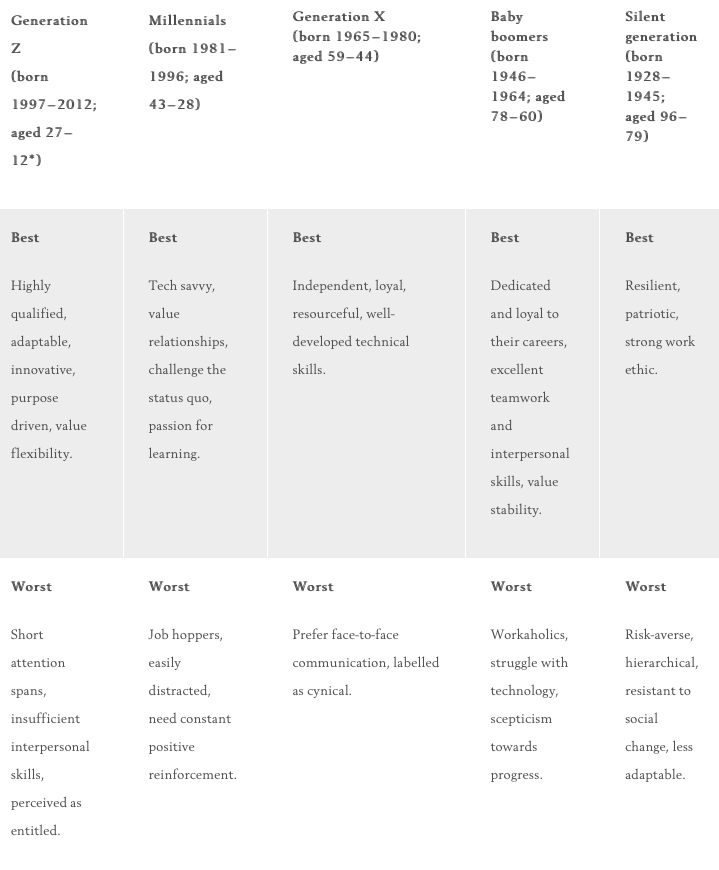The pre-pandemic leadership playbook won’t take us into the future with gen Z. So, how can managers connect and engage effectively with this generation?
QUICK TAKE
- Gen Z started working during pandemic lockdowns and economic uncertainty, which affected their early work experiences negatively.
- Gen Z prioritises working for organisations with a clear purpose. Instead of focusing on money, they want to feel like they’re making a positive impact.
- The future workforce depends on gen Z. Managers and organisations need to let go of old ways of working and adapt their leadership style to connect with this generation.
By Sonakshi Babbar
Do you remember a time before the internet? Born between 1997 (aged 27 in 2024*) and 2012, gen Z is the first generation that has lived nearly the entirety of their lives in an online world, growing up binge-watching streaming services and navigating life through memes.
Unfortunately, they’ve earned a bad rap in the workplace, often being labelled as snowflakes, easily distracted and entitled. And, this group is considered the most difficult generation to work with and manage, according to a US survey from Resume Builder.
This perception isn’t just a stereotype; it’s a real experience for gen Z, with a cross-sectional study conducted by ResearchMatch revealing that they face discrimination based on their generational cohort. They are perceived as less capable, more opinionated and more selfish than other generations.
Why does this matter? Because by 2030, gen Z and millennials (now aged between 28 and 43) will comprise more than half of our global workforce.
What makes gen Z different?
Like every generation, gen Z’s behaviours are shaped by the social and economic context in which they grew up – which included climate concerns, technology disruptions, widespread layoffs and economic uncertainties.
The COVID-19 pandemic further disrupted their work experience.
“The changes in the ways of working and the nature of social relationships that came with remote working, and fear of job uncertainties led to feelings of disconnection and disengagement,” says Richard Morris, senior research fellow at the University of Sydney and lead researcher of a study on generational differences in mental health trends.
This has led gen Z to have little interest in the old ways of working. According to the World Economic Forum, about half of gen Z workers globally report they would quit their job if it interferes with their work-life balance and 80% are looking to find a job that better fits with their values.
“Gen Z [individuals] want to work where the work aligns with their values and are highly committed to their work, but don’t hesitate to set clear boundaries regarding their self-worth and work-life balance,” says New Zealand based Liz Pennington, operational management consultant and workplace coach.
Pennington says gen Z is guided by a unique blend of anxiety and optimism.
“They worry for the environment, public policies, poverty and Indigenous rights. On the other hand, this generation also has great optimism focused on how they want to live a more fulfilling life, compared with previous generations who’ve focused on working hard and doing well.”
Gen Zers look for more than the pay from their job. According to a gen Z study by EY between 2020 and 2021, making money was not at the top of their list and was eclipsed by the desire to make a difference and be the best person they can be.
These priorities and changes in the ways of working have led gen Z to face an unprecedented mental health crisis. American gen Zers surveyed by global consultancy McKinsey, report the least positive outlook and the highest prevalence of mental illness of any generation. Australia is witnessing a similar trend, Morris says.
“The youngest generation is not following the same trend as the older generations. Instead of mental health improving with age, as has been the case with previous generations, the mental health graph is trending downwards.”
So, what should managers do?
Gen Z is different and managers will not get the best from their young talent if they play by the old rules. Managers must actively make efforts to understand the unique needs of this generation and build ways to work together.
Gen Z employees have a rich experience of remote working. A good portion of their time in the workforce has lacked the faceto- face time required to build professional bonds and hone interpersonal skills.
“As a manager, be very clear and intentional about relationship building right from the letter of offer,” Pennington says. “For example, if you’ve recruited someone, invite that person to events and workshops, so you can get to know them and help them get to know you.
“Make efforts to know them as a person, their interests, family and values, to build trust and authentic relationships.”
Articulate your organisational purpose
While gen Xers (aged between 44 and 59) and baby boomers (60 years and above) were more likely to focus on job security and stability before seeking meaning at work, gen Z seeks purpose and meaning from the outset. They won’t make compromises for a workplace that doesn’t fit their values, according to a study by the World Economic Forum.
“This generation wants to feel a sense of strong alignment between what they believe and what [the company] does. And they actively conduct due diligence on the organisation’s values and purpose,” Pennington says.
“This generation also has great optimism focused on how they want to live a more fulfilling life, compared with previous generations who’ve focused on working hard and doing well.” ~ Liz Pennington, Pennington Consulting
Pennington says it is important for leaders and organisations to be clear about their purpose so they can attract and retain gen Z talent.
“Your purpose is not the dusty mission statement on the wall. It is about your sense of purpose and clearly communicating your broader organisational goals that have a positive impact on the world,” she adds.
EY published findings from a gen Z study in 2021 stating that “companies cannot afford only lip service on the causes that matter. Stand for something or, in gen Z’s eyes, you stand for nothing.”
Give them a challenge
Gen Z is a highly qualified generation. According to a study by McCrindle, this cohort is the most technologically supplied, formally educated, globally connected and socially aware generation in history. This generation is less interested in qualifications but hungry for hands-on experience and stories that you can share with them.
Pennington recommends providing opportunities for gen Z to engage and learn from their contemporaries with experience through peer-based learning, reverse mentoring, workplace buddy systems and support groups.
Some 85% of gen Z workers in Australia and New Zealand believe that access to cutting-edge technology positively influences their job satisfaction, according to McCrindle.
“They don’t see learning new skills and technology as a stressor. They enjoy things that older generations didn’t used to enjoy, like job complexity and learning new skills,” says Morris. “Don’t try and oversimplify work for them.”
“They don’t see learning new skills and technology as a stressor. They enjoy things that older generations didn’t used to enjoy, like job complexity and learning new skills.” ~ Richard Morris, University of Sydney
Put mental wellbeing first
Around three-quarters of gen Zers globally put availability to mental health resources (such as counselling, wellbeing programs, relaxation app subscriptions, and subsidised yoga classes or gym memberships) as one of the top things they think about when choosing which companies to work for.
This generation has endured changes to their education and ways of working that no other generation has had to go through in the post-COVID environment.
“The young people in the workforce have changed in such a way that the positive aspects of work such as more job control and autonomy that comes with adulthood are not having the same protective effect against the negative aspects of work.” Morris says.
Pennington remarks the stress and anxiety experienced in the workplace stem from the conflict between the expectations of the job, which don’t align with the individual’s vision of work-life balance.
“Companies need to think beyond a one-size-fits-all approach to this generation’s mental health needs. Ask, and offer them different options to seek support – whether that’s through telehealth, behavioural tools or face-to-face support, podcasts or online communities,” she says.
“Some young people find it less confronting to speak about their emotional needs over the phone, as it allows them more freedom to express themselves.”
Offer them a seat at the table
More than other generations, gen Zers want to have their voices heard. Research by Deloitte Digital reveals that managers can harness the energy and problem-solving skills of gen Z by actively listening to them.
The greatest way to value gen Z is to ask them questions, Pennington says. “For example, if you are running workshops or a strategic planning meeting, make sure you are creating an inclusive environment for diverse people to share their ideas.
“When you create space to hear their thinking, you will hear ideas that are quite different and you have this tremendous opportunity available to you to solve problems and innovate.”
Generation cheat sheet
Gen Z is far from the first generation to acquire labels – good and bad. Here are the traits of other generations you might encounter, as described by researchers.














